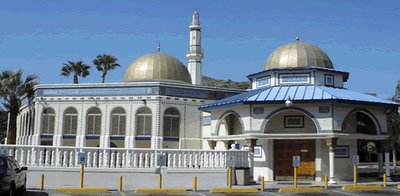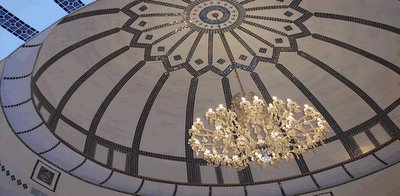Hast thou not Turned thy vision to one who disputed with Abraham About his Lord, because God had granted him power? Abraham said: "My Lord is He Who Giveth life and death." He said: "I give life and death". Said Abraham: "But it is God that causeth the sun to rise from the east: Do thou then cause him to rise from the West." Thus was he confounded who (in arrogance) rejected faith. Nor doth God Give guidance to a people unjust.
Or (take) the similitude of one who passed by a hamlet, all in ruins to its roofs. He said: "Oh! how shall God bring it (ever) to life, after (this) its death?" but God caused him to die for a hundred years, then raised him up (again). He said: "How long didst thou tarry (thus)?" He said: (Perhaps) a day or part of a day." He said: "Nay, thou hast tarried thus a hundred years; but look at thy food and thy drink; they show no signs of age; and look at thy donkey: And that We may make of thee a sign unto the people, Look further at the bones, how We bring them together and clothe them with flesh." When this was shown clearly to him, he said: "I know that God hath power over all things."
Behold! Abraham said: "My Lord! Show me how Thou givest life to the dead." He said: "Dost thou not then believe?" He said: "Yea! but to satisfy My own undertaking." He said: "Take four birds; Tame them to turn to thee; put a portion of them on every hill and call to them: They will come to thee (Flying) with speed. Then know that God is Exalted in Power, Wise."
2:258-260, Yusuf Ali Translation of the Qur'an
Jay Solomon, at The Zen of South Park, has been working his way through the Qur'an, trying to understand its meaning better. This week he focused on verses 2:258-260; the central point of his that I try to address is below:
It seems especially odd to me that someone speaking to God would then question matters that God says are so, like resurrection. It seems somewhat illogical since faith is believing without proof and Abraham already has proof of God since they’re chatting casually. Why would Abraham tell God that he has faith but that he just needs a little proof to lay his mind at ease. Needing proof is the essence of not having faith. As Jesus said, it is a wicked generation that needs signs. Not to go all Jesus quoting on anybody - I think it can be very annoying when people do that to make a point - but I do it to emphasize the notion of faith, which is Jesus’ point. You have to believe in things without being shown that they are so. Otherwise you don’t have faith.
This is my response:
I think your connection between verses 2:258 and 2:260 (faith vs. no faith) is very interesting. Personally, I don't see these two verses as being in such a black-and-white contrast; I do view them as a reaffirmation of Allah's (swt) power and ability in light of our niggling doubts.
Here's how I see these two verses. I think Ibrahim (pbuh) was an intelligent man, although he made occasional mistakes in judgment; for example, by associating the stars, moon and sun with Allah (swt) (6:74-79). In the end, he realized his errors and began worshiping Allah (swt) alone. Thus, by the time of his meeting with the king (Nimrod, according to Ibn Kathir) in 2:258, he correctly points out that the king's power is very limited, especially in comparison to that of Allah (swt).
However, as an intelligent man, he is beset by niggling doubts. I think this is a "curse" of intelligence, that we become so filled with facts and enamored with logic that our conscious and subconscious minds begin to fill us with questions about our faith. Some people lose that faith entirely; others (like me) battle time and time again with the questions. In this regard I see Ibrahim (pbuh) in a sympathetic light. I don't believe that I have no faith simply because I have doubts or questions. I believe my faith is tempered and strengthened through my internal jihad against the doubts and questions. In other words, despite the doubts and questions, my faith in Allah (swt) and Islam remains and grows stronger (and will continue to in the future, insha'allah).
So, by the time of verse 2:260, Ibrahim (pbuh) has his doubts and asks Allah (swt) for reassurance. Interestingly enough, Allah (swt) normally spurns providing such "proof," at least to unbelievers; for example:
If their spurning is hard on thy mind, yet if thou wert able to seek a tunnel in the ground or a ladder to the skies and bring them a sign,- (what good?). If it were God's will, He could gather them together unto true guidance: so be not thou amongst those who are swayed by ignorance (and impatience)! (6:35)
They say: "We shall not believe in thee, until thou cause a spring to gush forth for us from the earth, "Or (until) thou have a garden of date trees and vines, and cause rivers to gush forth in their midst, carrying abundant water; "Or thou cause the sky to fall in pieces, as thou sayest (will happen), against us; or thou bring God and the angels before (us) face to face: "Or thou have a house adorned with gold, or thou mount a ladder right into the skies. No, we shall not even believe in thy mounting until thou send down to us a book that we could read." Say: "Glory to my Lord! Am I aught but a man,- an apostle?"(17:90-93)
Ibrahim, however, is both a prophet (nabi) and a messenger (rasul) of Allah (swt), so Allah (swt) provides him with a miracle. Now the Qur'an mostly focuses on what I call lower-case miracles, the signs of Allah (swt) that permeate the universe to the point where we largely take them for granted. But in 2:260, we have an upper-case MIRACLE. Except, in Muhammad Asad's translation, you'd never know it.
In 2:259, the nameless traveler ('Uzayr/Ezra, according to Ibn Kathir) dies, is resurrected in 100 years, then is told to look at his food and drink, which remained fresh after all that time, and his donkey, which had died and was nothing more than bones. The donkey is resurrected in front of the traveller ("When this was shown clearly to him..."):
As-Suddi said, " `Uzayr observed the bones of his donkey, which were scattered all around him to his right and left, and Allah sent a wind that collected the bones from all over the area. Allah then brought every bone to its place, until they formed a full donkey made of fleshless bones. Allah then covered these bones with flesh, nerves, veins and skin. Allah sent an angel who blew life in the donkeys' nostrils, and the donkey started to bray by Allah's leave.'' All this occurred while `Uzayr was watching, and this is when he proclaimed,
(He said, "I know (now) that Allah is able to do all things,'') meaning, "I know that, and I did witness it with my own eyes. Therefore, I am the most knowledgeable in this matter among the people of my time.'' (Tafsir Ibn Kathir)
Now the traveler knows the true power of Allah (swt). Likewise, with Ibrahim (pbuh). He says to the king in 2:258 that "My Lord is He Who Giveth life and death." But apparently he thought to himself afterwards, "Did I speak truly?" So he asks Allah (swt) for a similar demonstration in His power to resurrect the dead. Allah (swt) asks, "Don't you believe?" To which Ibrahim (pbuh) says, "Yes, Lord, but I wish to be stronger in faith."
Now Muhammad Asad's translation reads,
Said He: “Take, then, four birds and teach them to obey thee; then place them separately on every hill [around thee]; then summon them: they will come flying to thee.
Sounds simple enough. Train the birds, place them on different hills, then call them; they will all return to you. But every other translation that I've checked (Pickthall, Yusuf Ali, Hilali & Khan, Ibn Kathir) all say that the birds were killed and dismembered first! Ibn Kathir:
And (remember) when Ibrahim said, "My Lord! Show me how You give life to the dead.'' He (Allah) said: "Do you not believe'' He (Ibrahim) said: "Yes (I believe), but to be stronger in faith.'' He said: "Take four birds, then cause them to incline towards you (then slaughter them, cut them into pieces), and then put a portion of them on every hill, and call them, they will come to you in haste. And know that Allah is All-Mighty, All-Wise.''
(cause them to incline towards you) means, cut them to pieces. This is the explanation of Ibn `Abbas, `Ikrimah, Sa`id bin Jubayr, Abu Malik, Abu Al-Aswad Ad-Dili, Wahb bin Munabbih, Al-Hasan and As-Suddi. Therefore, Ibrahim caught four birds, slaughtered them, removed the feathers, tore the birds to pieces and mixed the pieces together. He then placed parts of these mixed pieces on four or seven hills. Ibn `Abbas said, "Ibrahim kept the heads of these birds in his hand. Next, Allah commanded Ibrahim to call the birds to him, and he did as Allah commanded him. Ibrahim witnessed the feathers, blood and flesh of these birds fly to each other, and the parts flew each to their bodies, until every bird came back to life and came walking at a fast pace towards Ibrahim, so that the example that Ibrahim was witnessing would become more impressive. Each bird came to collect its head from Ibrahim's hand, and if he gave the bird another head the bird refused to accept it. When Ibrahim gave each bird its own head, the head was placed on its body by Allah's leave and power. ''
What more powerful demonstration of Allah's (swt) ability to resurrect the dead could there be? Ibn Abbas is reported to have said, "To me, there is no Ayah in the Qur'an that brings more hope than this Ayah.''















